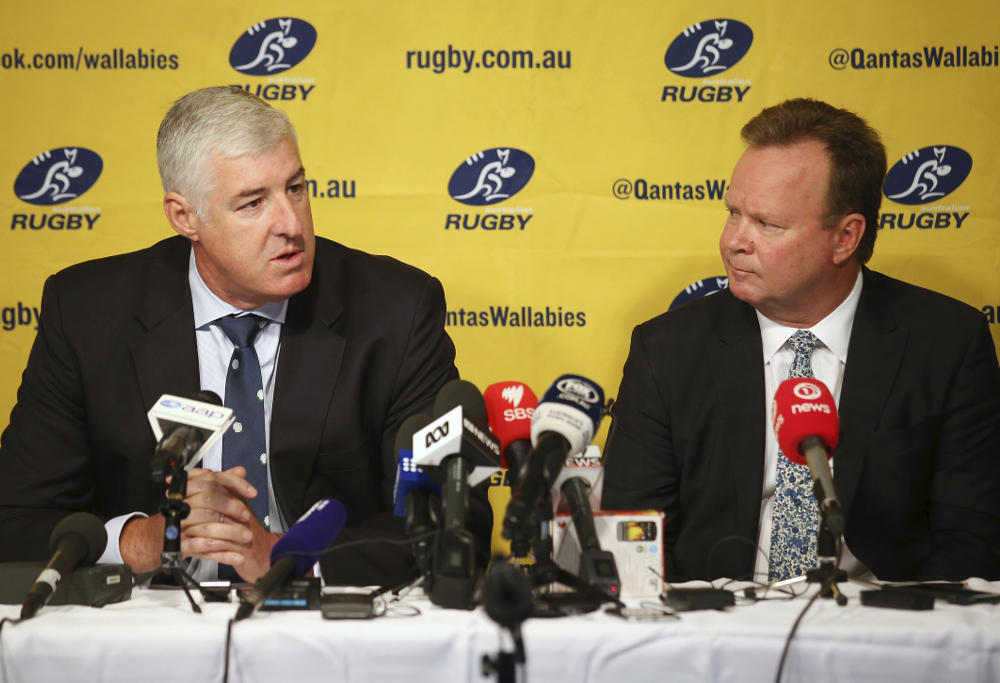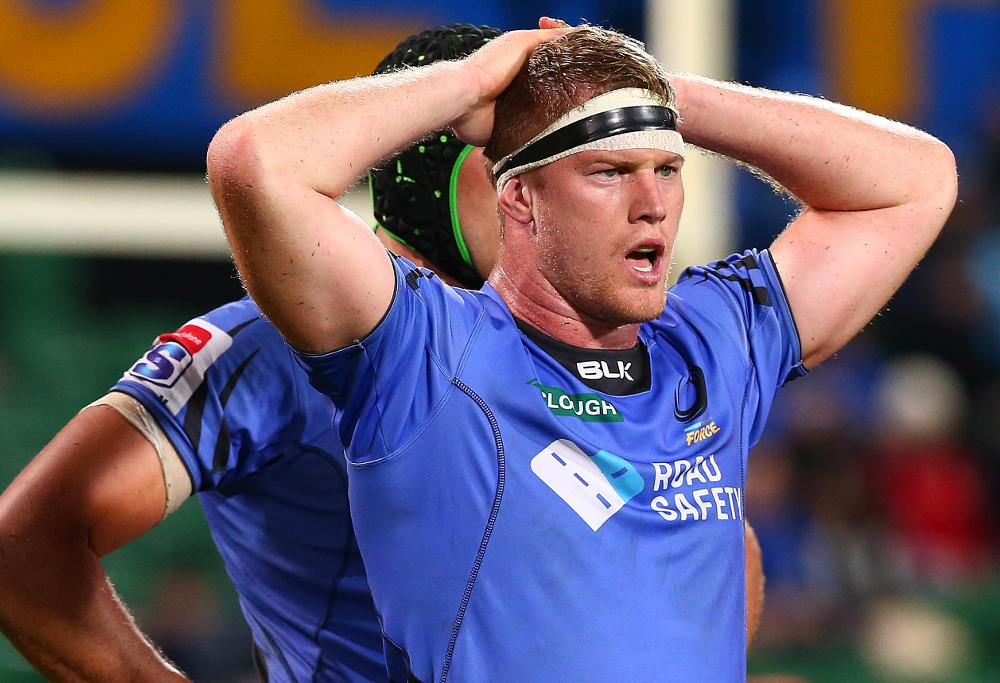The longest 72 hours in the history of Australian rugby has ended with the ARU finally announcing that it will “discontinue” the Force as the Super Rugby competition reverts to 15 teams from 2018.
If this was to mark the end of one of the sorriest chapters in Australian rugby that would be bad enough, but the likelihood for Australian rugby fans is that there is still a way to go before things bottom out completely. For one, the prospect of Wallabies stepping out next Saturday into a half-full ANZ Stadium to be spanked yet again by the All Blacks is hardly going to lighten the mood.
Force fans – and many others from all around the country – took to all forms of social media yesterday to register their disgust at the decision. We saw anger that is palpable and understandable.
Rugby in Western Australia continues to make strong progress, and it is inconceivable that this decision by the ARU to cut that off at the knees, can be made with any expectation that parents, club members and casual supporters of the game will not reconsider their emotional and financial commitment to the game.
History shows that, in similar circumstances, once the fog clears and the bitterness eventually subsides, most fans find a way to reconcile with their sport – if not with the organisation or individuals who they feel have wronged them. But that day feels like a long, long way away right now.
Bill Pulver announcing that he is going to step down as CEO of the ARU may help placate some angry fans, although that doesn’t make the outcome any easier to stomach. Pulver was likely close to the end of his tenure anyway and, once he has stayed around long enough to cop the brunt of the flak, this does seem like an opportune time to allow somebody new to start the rebuilding process – assuming that there is a suitably qualified sports administrator anywhere in the world willing to take on the poisoned chalice that is Australian rugby.
One thing Pulver said at yesterday’s press conference – “simply this is the right decision for Super Rugby” – reinforces that what is at the heart of the decision, is what is being missed in the emotion of the reaction.
Australian rugby and Super Rugby are two entirely different things. Yet they have become intertwined to the extent that a decision made to benefit a competition that comprises five competing nations, has earth-shattering consequences to the domestic fabric of one of those nations, Australia.
In short, this announcement, and the reverberations around it, can be seen as ‘payday’ for Australian rugby failing to develop its own domestic professional competition.
While it is Pulver and ARU Chairman Cameron Clyne who now cop all of the blame, a good deal of it might be better shared with John O’Neill and the administration that shut down the ARC after only one season in 2007 – ironically in times when Australian rugby still had a little bit of money in the bank.
A national domestic competition was needed back then as it is today but, as ever in Australian rugby, parochial state interest proved too big a hurdle to overcome. That the same argument is still run today, by self-interested Sydney and Brisbane clubs, that they, and not a truly national state or franchise competition, are the rightful ‘second tier’, speaks volumes for the deep rooted animosity that exists within the code. It shows the willingness for participants to point fingers at each other instead of coming together for the common good.
This is not just rugby’s problem by the way. This year we have seen the Australian Olympic movement, cricket, rugby league, AFL, netball and football all wage vicious civil war over matters of governance and/or salaries. It is the Australian way to bicker and challenge city hall, and rugby is not exempt.

(AP Photo/Rick Rycroft)
In the absence of a developed, domestic professional competition, Australian rugby lacks the flexibility to adapt to changing circumstances and engineer outcomes that don’t carry such high, ‘winner takes all’ stakes. Note how in the English Premiership, Bristol were relegated at the end of this season – at face value a disaster for their club – but in fact they are already planning for their return in 2018-19, and this week announced the signing of Charles Piutau for a reported £1m per season, making him the highest paid player in world rugby.
For the Force however there is no such luxury. It is all or nothing. Which is why fans, and lovers of the game around Australia, are today hurting so badly.
Also a misconception is the framing of this situation as a Force versus Rebels stand-off. In reality, it was never thus. Once the ARU determined that a side had to be cut, and that it was to be the Force, the Rebels were only ever window dressing and a bit of insurance if it turned out later that the Force couldn’t be shifted.
There are of course valid arguments as to why the Rebels should have been chosen instead, just as it is easy for many of those protesting today to forget their views about Force rugby during Michael Foley’s tenure as coach.

(Photo by Paul Kane/Getty Images)
Emboldened by the support of Andrew Forrest, there are also many who will wake today believing that the Force still won’t be moved, and indications are that an injunction to prevent the ARU from taking this action will be sought. Any such court action however, will have a very limited shelf-life. Who can blame players seeking certainty over where they will play their rugby next year, and once one or two start to confirm signings elsewhere, whatever happens in a court over the following months won’t really matter.
Ever since the ARU went public with the plan to revert to four Super rugby teams, the main reason touted has been “financial considerations.” These considerations are two-pronged –
firstly the cost to the ARU of maintaining five unsuccessful franchises, and secondly, the potential cost to Australian rugby and SANZAAR of not acceding to their broadcast partner’s wishes.
The harsh reality of professional sport is that, in order to fund the operation of game and pay the players, money has to be generated from somewhere. In the case of rugby, the predominant revenue source is broadcast rights. Unfortunately, Australian rugby has no capacity on its own to generate anything like the revenue required to sustain the game – at amateur or professional level.
Thus Australia’s fortunes are inextricably intertwined with SANZAAR’s. And if the broadcasters who are funding SANZAAR – read keeping the game afloat in the southern hemisphere – demand action, then it is action they must get, no matter how unpalatable to local fans.
To that extent, the seeds in yesterday’s announcement were sewn long ago in the boardrooms of cashed up clubs in France and England, and in the broadcast deals struck for the Top 14 and English Premiership, which have translated into enormous financial pressure being placed on the ARU.
Those whose initial reaction is to demand replacement of the ‘incompetents’ on the ARU executive and board, might ask themselves, ‘with who exactly’? Administrators from the other sports listed above, who are labeled similarly, by fans and players within those sports?
Or by new rugby people who will have to make tough decisions faced with the same external circumstances and the same meagre financial resources?
While the ARU can be excused for being subject to global economic realities that are out of its control, they can be fairly blamed for two massive blunders, one of which has made this situation far worse than what it should have been, and the other which represents a huge opportunity lost for the wellbeing of the game in the future.
The ARU knew that this day was coming a long time ago, certainly at some time during 2016. It should have ripped the band-aid off during the off-season and done so secure in the knowledge that they were on solid legal footing. The damage done to this year’s Super Rugby competition and to the goodwill of the game has been far greater than it needed to be as a result of this failing.
In a time when money for the game is so scarce it is also unfathomable how they have made an enemy of Australia’s wealthiest man. It is true that Andrew Forrest entered the debate late in the day, but his support and liking for rugby – and his willingness to be a benefactor for causes he sees as just – has been no secret.
Another administration might well have found a way to have had Forrest at a table long before now, and had him on-side, working together to advance rugby’s cause in Australia.
Needless to say, that opportunity is now lost.
Indeed there is so much that has been lost, and will be lost in the future, as a result of this debacle. Good men have lost their jobs, players will now have played their last professional rugby, and fans have lost their team.
Rugby will survive all of this because ultimately, the game is always bigger than us all. But it is entirely understandable if, for now at least, rugby folk who support the Force feel like the sun has gone down on the west for good.































































































